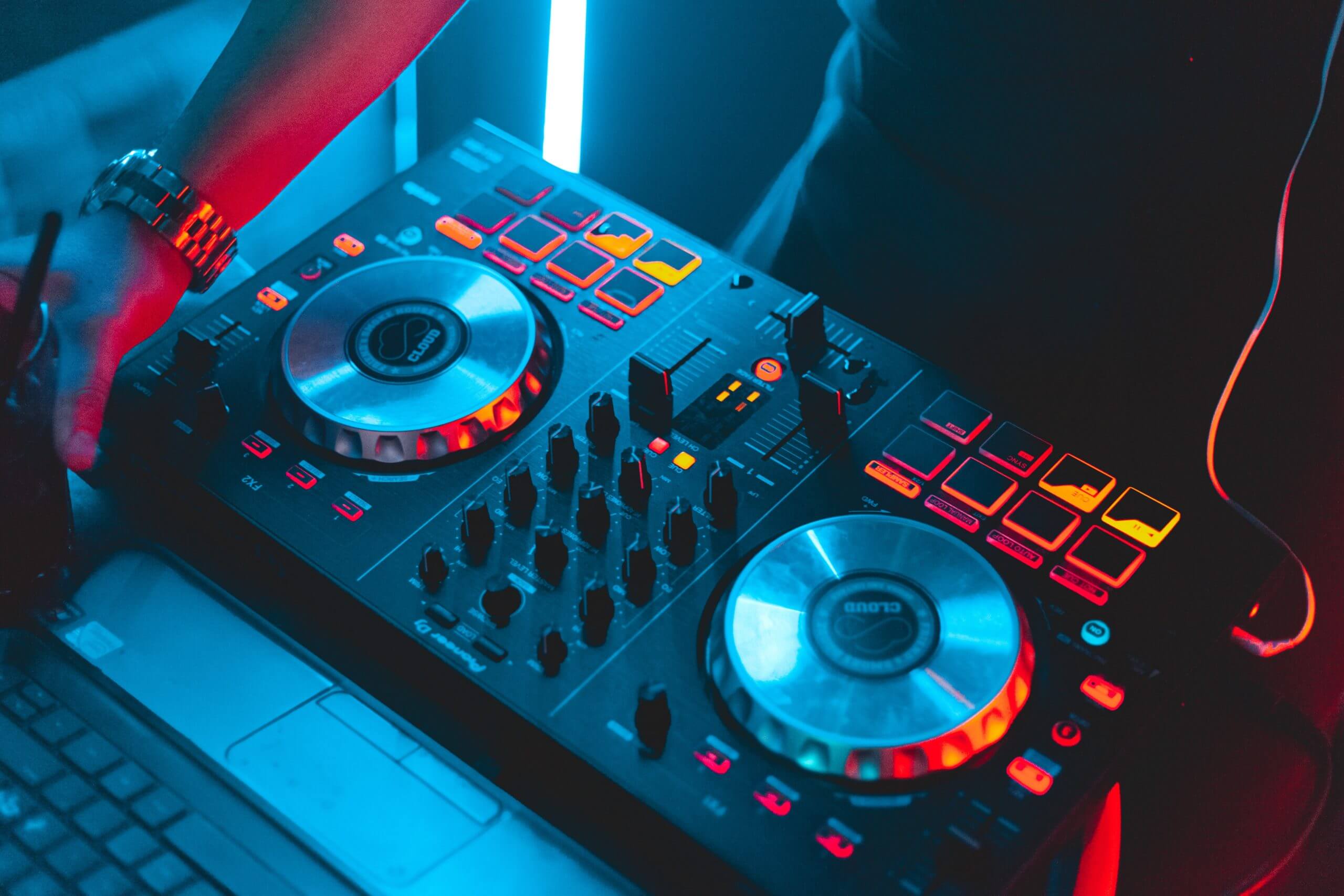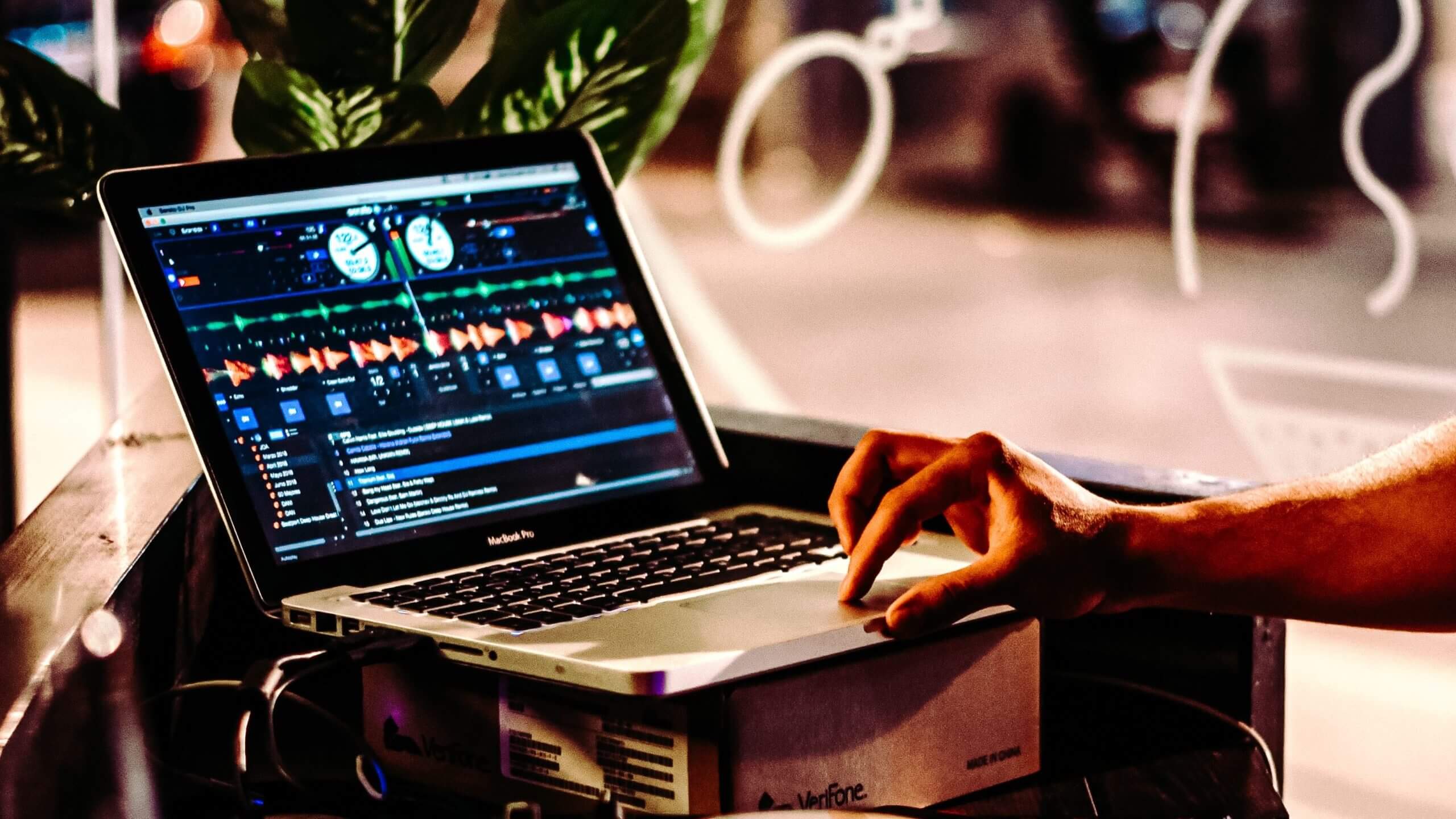It doesn’t matter what your level of music producing experience is -whether you’ve been a DJ for years or this is your first time looking into beginner DJ equipment – having a home DJ setup is incredibly important.
In fact, you could make the argument that a home DJ setup is an outright requirement for anyone that wants to do more than small or medium-sized gigs.
Having your own DJ equipment and setup is essential for any DJ that wants to improve their skills and produce high-quality sounds and music.
Now, for most people, the idea of putting together a complete DJ setup sounds pretty difficult.
It’s one thing to download a DJ app on your phone and call yourself a DJ.
Getting and setting up all the DJ equipment to produce professionally produced music is quite another.
Home DJ Setup Part One: The DJ Equipment Essentials
Thankfully, the process of setting up a beginner DJ setup isn’t nearly as tough as you might think.
Whereas a thousand years ago (i.e., the late 80s) a DJ needed a PA sound system, DJ Mixer, turntable, and several other essentials just to play any music at all, today they just need a basic DJ controller and a computer – with professional DJs only needing a couple of extras added.
In this guide, we’ll go over all of the different components you’ll need to get started.
From there, you’ll be in the perfect position to begin producing whatever type of music you want, right from your home; whether that’s fun small mixes that you and your friends can enjoy; high-speed mixes that you’ll play at parties, clubs, and events; or stuff so good, it’s meant for the world.
When it comes to the modern DJ, things are indeed very different from the art’s origin. Back in the day, you needed a whole PA system, an expensive turntable desk, DJ mixer and a ton of records.
Now, DJ equipment basics have changed a lot. Today, you need just a few basic essentials to get started DJing at any level. These things consist of a computer or tablet, a beginner DJ controller, and some software.
1. The Computer

The most basic of the basics, the first thing you’re going to need as a DJ is some type of computer.
Most people, they will end up using a laptop with a beginner DJ controller, though there are some great tablet options to choose from.
Having a functioning and quality laptop computer is vital for being a DJ at any level.
Whereas older DJs needed a ton of CDs on hand throughout their career, a laptop can compress all of that into a few digital files you can access at the click of a button.
Because of this, you’ll be able to take advantage of the different creative tools currently available.
Most modern beginner DJ equipment is built and designed as a companion piece with a computer and certain types of software.
Not only that, but you’ll need a computer if you plan to make your own killer music tracks.
The extensive range of DAW’s (Digital Audio Workstation) offers a ton of different tools you can use to become a master in music creation.
By not having a computer to run any of these different types of software, you’re effectively choosing to make things difficult for yourself.
A computer also is essential for those that want a wide collection of music to play with.
Yes, some local stores have broadened their available size, but that doesn’t mean you’ll know what to look for – nor does it mean the track that you’re even looking for will be available.
By using a computer, you can get whatever song, track, or file you want immediately. You’ll be able to do some research on specific sounds and get exactly what you want, without guessing or dealing with uncertainty.
The Type of Computer You’ll Need
When it comes to the type of computer you’ll need, there are a lot of different options to choose from. The good news is that, so long as you have a general idea of what to look out for, you’ll be ok no matter what you get.
Ideally, you’ll want to check out a computer’s RAM as well as its processor before making any decisions. This will usually mean a computer with at least 8 GBs of RAM and between an i5 or an i7 processor.
To more accurately determine what will work best for what you’re looking for, be sure to check out the requirements for any DJ software you’re interested in.
Apple vs. Windows: Which is Better?
There’s a heated debate over which computer works best for producing music or DJing, and both sides have compelling arguments.
Honestly, while there may certainly be a winner between the two, the difference is going to be so small, that the argument is kind of pointless.
Regardless of which type of computer you get, pretty much all software, gear & equipment, and accessories will work just fine.
That means it really boils down to your personal preference for computer machines. If you’re a fan of Apple and MacBooks, then get a MacBook Pro or Airbook.
If you are a fan of Windows and the various computer options offered, get a Windows computer.
2. DJ Controllers

While a computer is certainly an essential foundation, you won’t be doing all that much DJing unless you’ve got some DJ equipment to play with.
Actually, this is the most important piece you’ll need to focus on for your home setup.
As important as your laptop or DJ software is, it’s your DJ controller that you’ll be spending the most time in front of. As such, you must do the most research on what your best options are before investing any money.
There are many different DJ controller options to choose from, so you won’t have to worry about a lack of options.
Make sure to read the descriptions and reviews of any option you decide on.
You’ll also want to ideally pick something that’s got a long lifespan as well as something that meets both your initial needs as well as any future needs you may have as your skills improve.
Dealing with the Top Brands
It’s important when determining what type of beginner DJ controller you’ll get, to consider sticking with the most well-established brands, such as Pioneer DJ controllers.
Yes, there may be some great finds out there, but you’re taking an unnecessary risk investing your money, time, and energy.
Pioneer DJ is the most popular brand but they are certainly being given a run for their money these days by other manufacturers such as Denon DJ.
Particularly if you’re just starting, I’d advise using the well-established brand options like Pioneer DJ controllers or Denon DJ units.
Pioneer DJ has a particularly wide range of DJ gear catering to all skill levels.
Companies to go with are:
These companies are all known for producing effective and quality DJ controllers that will work. They each have a wide variety of options based on your price point as well as experience level, so there’s really no need to experiment.
Your Type of Setup
When it comes to what type of DJ controller setup you want, there are a few options to choose from. You can go for the classic turntable style, a more utility-based CD style, or the more modern standalone DJ controllers.
Turntable Decks Setup
Vinyl turntables are great for the person that wants that authentic DJ experience that most people imagine when taking up this profession. It is great if you currently have some vinyl that you want to mix or scratch with. Keep in mind, however, that it’s probably going to be the most expensive, both in starting out as well as overall upkeep.
Plus you will need to invest in a DJ mixer and suitable DJ stand or table.
CDJ Decks Setup
A CDJ-based setup is ideal if you’ve already got a bunch of CDs, and want to put them to use in the modern era. It’s definitely right in the middle between the turntable and standalone setups in terms of cost, so it’s worth considering if you’ve got a bit of fund and a lot of CDs you want to repurpose.
Standalone Controller Setup
Standalone DJ controllers are the best option for most starting out, as you don’t need anything additional outside of a computer and some software. It’s the smallest of the three options as well as (generally speaking) the cheapest. There are even some high-grade options that you can use at parties and events, making it the most ideal of the three for most DJs.
A standard DJ controller will incorporate jog wheels, mic inputs, performance pads, hot cues, fx functions, and a variety of other built-in controls.
Ultimately, whichever one you want will be based on your budget and personal choice. Ideally, make sure your choice is thoroughly researched so you are properly investing your time in DJ controllers that work best for you.
3. DJ Software

Now that you’ve gotten all of your hardware covered, now it’s time to spend a bit of energy deciding the best DJ software that will work for you.
DJ software works by emulating a traditional beginner DJ setup. With it, you’ll be able to mix songs into one another as well as manipulate many of their aspects.
The majority of modern setups are meant to work alongside DJ software, with many different DJ controllers even coming pre-installed with LITE versions that can be upgraded later.
Not only that but there are also some free applications you can download as well.
Some of the more commonly available software pieces used include Native Instruments’ Traktor Pro, Pioneer’s rekordbox DJ, Virtual DJ, and Serato DJ Pro and Lite.
DAW Software
In addition to quality DJ software, you’ll also need a few extra pieces based on just how seriously you’re taking your DJing. For beginners, just using the DJ software should be enough.
However, if you’ve already started practicing for a few months, and know what you’re doing, you’ll want to invest in a few things; namely, a DAW.
A good DAW software will allow you to compose your music and create your own, personalized tracks. While it isn’t a requirement, investing in creating your own tracks is a great way to stand out from the sea of other DJs that are mixing and recycling the same available music.
DAW software packages can often tend to be fairly expensive, so you’ll want to wait until after you’ve really gotten proficient in using the standard DJ software and DJ controllers before exploring this option.
Home DJ Setup Part Two: Upping The Sound

After you’ve gotten the basics of your home DJ equipment established, your next area of focus should be improving your overall sound quality. This can range from your own personal listening experience via DJ headphones, investing in quality speakers for closed groups, and adding in the best subwoofer options for those planning on performing at parties, clubs, and events.
If you are just starting out, you’ll want to make sure you’ve really got the essentials down before jumping into making a huge investment in your sound setup. Cheap DJ controllers, useless software, or a constantly crashing computer will make even the best set of speakers and subwoofers pointless.
1. Get a Good Pair of DJ Headphones
Depending on who you ask, the importance of headphone quality can vary greatly. Some people believe that headphone quality doesn’t really matter so long as they are functional.
Others feel that headphones are potentially the most important accessory if you want to catch the most minute areas of detail.
And, while I hate to fence-sit, both sides make really good points and should be taken into consideration.
If you’re just getting started, and don’t have a huge budget planned, headphones shouldn’t be your first option. Rather, you’re better off investing in quality speakers as they’ll have a wider functional use.
If you do have some understanding of DJing and have decided to increase your DJ equipment budget, getting a good pair of headphones can be a great investment, both in terms of sound & comfort as well as being able to note the perfect mix and alter points between tracks.
Headphones can also be a great way to distinguish yourself in terms of your style and personality. Rather than just being referred to as “that DJ that plays good music”, you’ll instead be known as “that DJ that plays good music while wearing spiked smiley face headphones.” It’s a simple inclusion, but an effective distinction.
DJ Headphones vs. Personal Headphones
One of the biggest marketing gimmicks that beginner DJs fall for, when it comes to headphones, is claims that all headphones are created equal. This couldn’t be further from the truth. If you are planning to invest in proper headphones, make sure you’re getting headphones that actually work DJs.
Personal or gaming headphones may seem the same, but they aren’t. DJ headphones are specifically created to note the smallest changes in a track.
They provide more than just a moderately high level of hearing clarity generally offered by gaming or personal headphones.
Your best bet is to stick to the beginner DJ headphone brands that have a proven track record of producing professional quality DJ headphones. Just keep in mind that these can certainly get pricey, though they’re certainly worth the investment if you’ve got the money.
Open Back vs. Closed Back Headphones
After you’ve pinned down the right company you want to get headphones from, your next choice is to decide whether to get open or closed-back headphones. Open-back headphones – as the name implies – have an open back that allows your ears to breathe, granting you a higher level of sound quality.
In exchange, open-back headphones need to be used in quiet areas as they are more susceptible to outside sounds leaking in than closed-back headphones.
2. Setting Up Quality Speakers

Next, after getting a good pair of DJ headphones, is investing in a quality set of speakers. Speakers are used to accurately represent exactly what your music sounds like.
The better your speakers, the better the overall sound will be when playing them in open settings or without your DJ headphones.
Computer speakers or a Hi-Fi system may certainly work well enough when just starting out, however, you’ll want to get some DJ-certified speakers at some point, especially if you plan on really getting serious as a DJ.
Studio Monitors
Thankfully, as with most DJ controllers, quality speakers are widely available. That means you won’t be without your fair share of choices based on what you’re looking for.
Ideally, you’ll want to be on the lookout for a pair of studio monitors that will transmit sound as pure as possible through the use of studio monitors. These are great for both mixing tracks as well as creating your own personalized music.
Just keep in mind that the size of the monitors will determine the best space to use them in. Small studio monitors, for example, will not fill a large room as effectively as large studio monitors.
Hi-Fi Systems
Hi-Fi systems are ideal for those looking to play their music at parties and large events. They won’t deliver the purest level of sound, but they aren’t meant to. Instead, Hi-Fi places emphasis on a track’s highs and lows as a way to add a more dynamic feeling to the music.
Rather than smaller areas, a Hi-Fi system is meant to cover and fill larger spaced areas.
When deciding what you want between the two speakers, your first and most important decision needs to be what you are going to use them for. If you plan to create your own music, or are interested in hearing things in their purest state, invest in a pair of quality studio monitor speakers.
If you are planning to play at parties, weddings, and larger crowds & venues, getting a Hi-Fi setup is going to be more your style.
3. Adding-in Subwoofers
Subwoofers, while great in their own right, are really meant as an add-on to whatever speaker setup you have. Subwoofers, while not mandatory (particularly if you’ve got a good set of Hi-Fi speakers) are great if you plan to play are very large crowds, nightclubs, or otherwise loud events where the music needs to travel over a wide distance.
If you plan to play in larger areas, subwoofers work by reducing the amount of pressure put on your main speakers, preventing them from wearing out.
If you’re using 5-inch studio monitors or below, this is incredibly important, as those are the aptest to begin straining over time.
Ultimately, subwoofers are ideal if you need to add that extra bit of “oomph” to your sound while reducing the strain your main speakers are put under. There are both commercial and studio-based subwoofers.
Studio subwoofers are generally a bit smaller and are meant to add to studio speakers while ensuring the sound quality remains high. Commercial subwoofers are generally a bit larger and the ones you are more likely to use when going to large events where you need a lot of sounds.
Home DJ Setup Part Three: Music, Cables, & Accessories

Now that we’ve gone over the essentials and foundational pieces for your home DJ setup, now it’s time to add on some useful extensions and accessories.
1. Setting Up Your Cables
Starting off, we’re going to go over your cords and cables. First things first, cables in and of themselves are not optional. Unless you’ve decided to invest in wireless speakers, headphones, subwoofers, and speaker wire, odds are that cables and the use of a USB cable will be a necessity.
The thing that makes cables an additional piece is the fact that the quality of the cables can vary greatly depending on whether they are the standard factory-issued option or a higher-quality cable.
Similarly, investing in a device that makes connecting your cables easier and less prone to tangling, can be incredibly useful.
2. Getting Some Good Music
As with cables, it needs to be said that “music” isn’t an option if you plan to be a DJ. Music for a DJ is like a baseball bat for a baseball player or seeds for a gardener.
The type of music you’re playing, and the method you use, however, that’s a different story entirely.
Whether you plan to use digital files, vinyl records, or CDs all play an impact on the type of music you produce as well as the amount of music you have available.
No matter what, you’ll want to have a large number of tracks available in order to mix and transition from one to the next.
While your ultimate goal is to have a huge collection of songs to pull from, in the beginning, you can start with the top songs on the radio or some of your favorites. If you’re using a CDJ setup and have a large enough CD collection, that can really be all you need in the beginning.
Music Organization
Just as important as it is to have a music collection, it’s more important that that collection be effectively organized. Tagging your tracks as well as setting up cue points will make DJing a much easier and streamlined process.
Most DJ software pieces come with track tagging included, so that shouldn’t be too much of a problem.
Starting out, I’d suggest starting in one set genre that you personally enjoy. This makes the process of keeping track and tagging songs easier than mixing genres or playing music you don’t connect to.
3. Stand Out with Some Accessories
Finally, if you want to go above and beyond, adding in some smaller inclusions can really have a positive impact on your DJing experience, whether that stays at home or goes out to parties and events.
Specifically, regarding your home setup, you’ll want to consider getting a good desk and chair. Just as you are going to be using your DJ controllers a lot, you’re going to be sitting in your chair a lot too. You’ll want to have something that’s comfortable while supportive.
Similarly, things like a surge protector or speaker stands are also great additions for upping the quality of your performance while also reducing any potential power issues.
For those that want to enjoy more lively aesthetics, or want to make their DJing experience more fun if performing at a venue, investing in some party lights can be a great option.
A few DJ controllers have party lights included while third-party light additions can be added to any DJ’s set up as a way to make them stand out from everyone else.
Home DJ Set up: Takeaway
The process of building your first beginner DJ setup and collecting your initial beginner DJ gear can be overwhelming if you don’t know where to start.
However, by having a full understanding of what you need as a beginner, intermediate, and experienced DJ, you can ensure your home setup plays well no matter what your goals are or how serious you want to take DJing into the future.
So what are you waiting for?
If you’re just starting out, focus on getting a good beginner DJ controller and computer. Start small with the free or LITE software options included and go from there.
Pioneer DJ has a great range of entry-level DJ gear.)
Get out there, get started on your DJ gear, and get mixing out!
Related Articles
- Best DJ Headphones (2024): Expert Picks from Sennheiser, Pioneer DJ & More
- Best Powered Speakers (2024) A.K.A Active Speakers or Self-Powered Speakers
- Best DJ Speakers (2024): Ultimate Guide to Superior Sound
- What DJ Equipment Do I Need? (Without The Need for a BANK Loan!)
- Studio Monitor Vs. Speaker: What’s the Difference?




